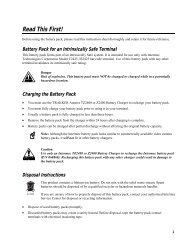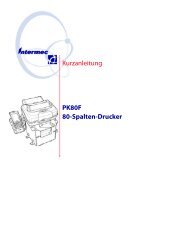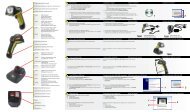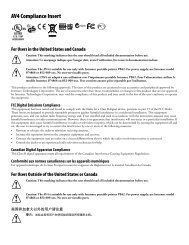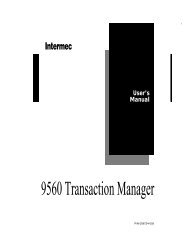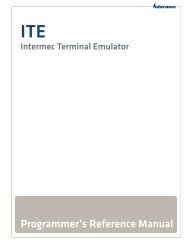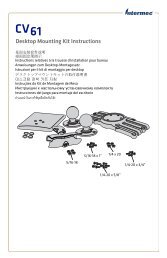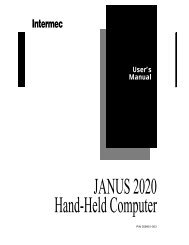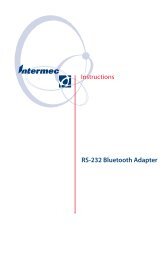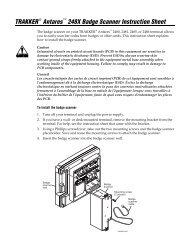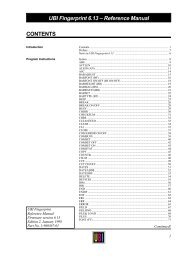- Page 1 and 2:
Reference Manual P/N 1-960434-02 Ed
- Page 3 and 4:
Contents, cont'd. 2. Program Instru
- Page 5 and 6:
Contents, cont'd. 2. Program Instru
- Page 7 and 8:
Contents, cont'd. Chapter 1 Introdu
- Page 9 and 10:
News in Intermec Fingerprint 7.2 In
- Page 11 and 12:
Program Instructions Syntax Chapter
- Page 13 and 14:
ACTLEN Chapter 2 Program Instructio
- Page 15 and 16:
ALIGN (AN), cont'd. Remarks, cont'd
- Page 17 and 18:
ASC Chapter 2 Program Instructions
- Page 19 and 20:
BARFONT (BF) Chapter 2 Program Inst
- Page 21 and 22:
BARFONT ON/OFF (BF ON/OFF) Chapter
- Page 23 and 24:
BARMAG (BM) Chapter 2 Program Instr
- Page 25 and 26:
BARSET Chapter 2 Program Instructio
- Page 27 and 28:
BARTYPE (BT) Field of Application S
- Page 29 and 30:
BREAK Chapter 2 Program Instruction
- Page 31 and 32:
BREAK, cont'd. Chapter 2 Program In
- Page 33 and 34:
BUSY Chapter 2 Program Instructions
- Page 35 and 36:
CHECKSUM Chapter 2 Program Instruct
- Page 37 and 38:
CLEANFEED Field of Application Stat
- Page 39 and 40:
CLL Chapter 2 Program Instructions
- Page 41 and 42:
CLOSE Chapter 2 Program Instruction
- Page 43 and 44:
COMBUF$ Chapter 2 Program Instructi
- Page 45 and 46:
COMSET, cont'd. Chapter 2 Program I
- Page 47 and 48:
COMSET ON Chapter 2 Program Instruc
- Page 49 and 50:
CONT Chapter 2 Program Instructions
- Page 51 and 52:
COUNT& Chapter 2 Program Instructio
- Page 53 and 54:
CSUM Chapter 2 Program Instructions
- Page 55 and 56:
CUT ON/OFF Chapter 2 Program Instru
- Page 57 and 58:
DATEADD$ Chapter 2 Program Instruct
- Page 59 and 60:
DELETE Chapter 2 Program Instructio
- Page 61 and 62: DEVICES Chapter 2 Program Instructi
- Page 63 and 64: DIM Field of Application Statement
- Page 65 and 66: DIR, cont'd. Remarks, cont'd. Bar C
- Page 67 and 68: END Chapter 2 Program Instructions
- Page 69 and 70: ERL Chapter 2 Program Instructions
- Page 71 and 72: ERROR Chapter 2 Program Instruction
- Page 73 and 74: FIELD Chapter 2 Program Instruction
- Page 75 and 76: FILE& LOAD Chapter 2 Program Instru
- Page 77 and 78: FONT (FT) Chapter 2 Program Instruc
- Page 79 and 80: FONTD Chapter 2 Program Instruction
- Page 81 and 82: FONTS Chapter 2 Program Instruction
- Page 83 and 84: FORMAT Chapter 2 Program Instructio
- Page 85 and 86: FORMAT DATE$ Chapter 2 Program Inst
- Page 87 and 88: FORMAT TIME$ Chapter 2 Program Inst
- Page 89 and 90: FRE Chapter 2 Program Instructions
- Page 91 and 92: FUNCTEST, cont'd. Chapter 2 Program
- Page 93 and 94: FUNCTEST$, cont'd. Chapter 2 Progra
- Page 95 and 96: GETPFSVAR Field of Application Func
- Page 97 and 98: GOSUB, cont'd. Chapter 2 Program In
- Page 99 and 100: HEAD Chapter 2 Program Instructions
- Page 101 and 102: IF...THEN...(ELSE) Chapter 2 Progra
- Page 103 and 104: IMAGE BUFFER SAVE Chapter 2 Program
- Page 105 and 106: IMAGENAME$ Chapter 2 Program Instru
- Page 107 and 108: IMMEDIATE ON/OFF Chapter 2 Program
- Page 109 and 110: INPUT (IP) Chapter 2 Program Instru
- Page 111: INPUT ON/OFF Chapter 2 Program Inst
- Page 115 and 116: INVIMAGE (II) Chapter 2 Program Ins
- Page 117 and 118: KEY ON/OFF Chapter 2 Program Instru
- Page 119 and 120: KEYBMAP$ Chapter 2 Program Instruct
- Page 121 and 122: KEYBMAP$, cont'd. Chapter 2 Program
- Page 123 and 124: KILL Chapter 2 Program Instructions
- Page 125 and 126: LAYOUT, cont'd. Remarks, cont'd. Lo
- Page 127 and 128: LAYOUT END Chapter 2 Program Instru
- Page 129 and 130: LAYOUT RUN Chapter 2 Program Instru
- Page 131 and 132: LED ON/OFF Chapter 2 Program Instru
- Page 133 and 134: LEN Chapter 2 Program Instructions
- Page 135 and 136: LINE INPUT Chapter 2 Program Instru
- Page 137 and 138: LIST Chapter 2 Program Instructions
- Page 139 and 140: LOAD Chapter 2 Program Instructions
- Page 141 and 142: LOF Chapter 2 Program Instructions
- Page 143 and 144: LTS& ON/OFF Chapter 2 Program Instr
- Page 145 and 146: MAP Chapter 2 Program Instructions
- Page 147 and 148: MERGE Chapter 2 Program Instruction
- Page 149 and 150: NAME DATE$ Chapter 2 Program Instru
- Page 151 and 152: NASC Field of Application Statement
- Page 153 and 154: NASCD Chapter 2 Program Instruction
- Page 155 and 156: NORIMAGE (NI) Chapter 2 Program Ins
- Page 157 and 158: ON COMSET GOSUB Chapter 2 Program I
- Page 159 and 160: ON ERROR GOTO Chapter 2 Program Ins
- Page 161 and 162: ON GOTO Chapter 2 Program Instructi
- Page 163 and 164:
ON KEY GOSUB, cont'd. Remarks, cont
- Page 165 and 166:
ON/OFF LINE Chapter 2 Program Instr
- Page 167 and 168:
OPEN, cont'd. Chapter 2 Program Ins
- Page 169 and 170:
PORTIN Chapter 2 Program Instructio
- Page 171 and 172:
PRBAR (PB) Field of Application Sta
- Page 173 and 174:
PRIMAGE (PM) Chapter 2 Program Inst
- Page 175 and 176:
PRINT KEY ON/OFF Chapter 2 Program
- Page 177 and 178:
PRINTFEED (PF) Chapter 2 Program In
- Page 179 and 180:
PRINTONE Chapter 2 Program Instruct
- Page 181 and 182:
PRLINE (PL) Field of Application St
- Page 183 and 184:
PRPOS (PP), cont'd. Chapter 2 Progr
- Page 185 and 186:
PRTXT (PT) Chapter 2 Program Instru
- Page 187 and 188:
PUT Chapter 2 Program Instructions
- Page 189 and 190:
RANDOMIZE Chapter 2 Program Instruc
- Page 191 and 192:
REBOOT Field of Application Stateme
- Page 193 and 194:
REM (') Chapter 2 Program Instructi
- Page 195 and 196:
RENUM Chapter 2 Program Instruction
- Page 197 and 198:
RETURN Chapter 2 Program Instructio
- Page 199 and 200:
RSET Chapter 2 Program Instructions
- Page 201 and 202:
RZ Chapter 2 Program Instructions F
- Page 203 and 204:
SAVE, cont'd. Chapter 2 Program Ins
- Page 205 and 206:
SETPFSVAR Chapter 2 Program Instruc
- Page 207 and 208:
SETUP Chapter 2 Program Instruction
- Page 209 and 210:
SETUP, cont'd. Chapter 2 Program In
- Page 211 and 212:
SGN Chapter 2 Program Instructions
- Page 213 and 214:
SOUND Chapter 2 Program Instruction
- Page 215 and 216:
SPLIT Chapter 2 Program Instruction
- Page 217 and 218:
STORE IMAGE Chapter 2 Program Instr
- Page 219 and 220:
STORE OFF Chapter 2 Program Instruc
- Page 221 and 222:
STRING$ Chapter 2 Program Instructi
- Page 223 and 224:
SYSVAR, cont'd. Remarks 1 - 12. Not
- Page 225 and 226:
SYSVAR, cont'd. Chapter 2 Program I
- Page 227 and 228:
SZ Chapter 2 Program Instructions F
- Page 229 and 230:
TICKS Chapter 2 Program Instruction
- Page 231 and 232:
TIMEADD$ Chapter 2 Program Instruct
- Page 233 and 234:
TRANSFER KERMIT Chapter 2 Program I
- Page 235 and 236:
TRANSFER ZMODEM Chapter 2 Program I
- Page 237 and 238:
TRANSFERSET Chapter 2 Program Instr
- Page 239 and 240:
VAL Chapter 2 Program Instructions
- Page 241 and 242:
VERSION$ Chapter 2 Program Instruct
- Page 243 and 244:
WEEKDAY$ Chapter 2 Program Instruct
- Page 245 and 246:
WHILE...WEND Chapter 2 Program Inst
- Page 247 and 248:
Chapter 3 Image Transfer Image Form
- Page 249 and 250:
Chapter 3 Image Transfer Image Form
- Page 251 and 252:
UBI10, cont'd. Chapter 3 Image Tran
- Page 253 and 254:
Chapter 4 Character Sets Roman 8 Ch
- Page 255 and 256:
Chapter 4 Character Sets Spanish Ch
- Page 257 and 258:
Chapter 4 Character Sets English (U
- Page 259 and 260:
Chapter 4 Character Sets Norwegian
- Page 261 and 262:
Chapter 4 Character Sets Japanese L
- Page 263 and 264:
Chapter 4 Character Sets PCMAP Char
- Page 265 and 266:
Chapter 4 Character Sets MS-DOS Lat
- Page 267 and 268:
Chapter 4 Character Sets MS-DOS Lat
- Page 269 and 270:
Chapter 4 Character Sets MS-DOS Tur
- Page 271 and 272:
Chapter 4 Character Sets Windows Cy
- Page 273 and 274:
Chapter 4 Character Sets Windows Gr
- Page 275 and 276:
Chapter 4 Character Sets Windows Ba
- Page 277 and 278:
Standard Bar Codes Chapter 5 Bar Co
- Page 279 and 280:
UPC-E UPC-A BARTYPE: "UPCE" BARRATI
- Page 281 and 282:
Code 128 EAN128 Chapter 5 Bar Codes
- Page 283 and 284:
Setup Bar Codes, cont'd. Chapter 5
- Page 285 and 286:
Fonts Introduction Chapter 6 As sta
- Page 287 and 288:
Printout Samples Chapter 6 Fonts Th
- Page 289 and 290:
OCR-B 10 Pitch BT Character Set Cha
- Page 291 and 292:
Error Messages Interpretation Table
- Page 293:
NOTES Intermec Fingerprint 7.2 - Re



